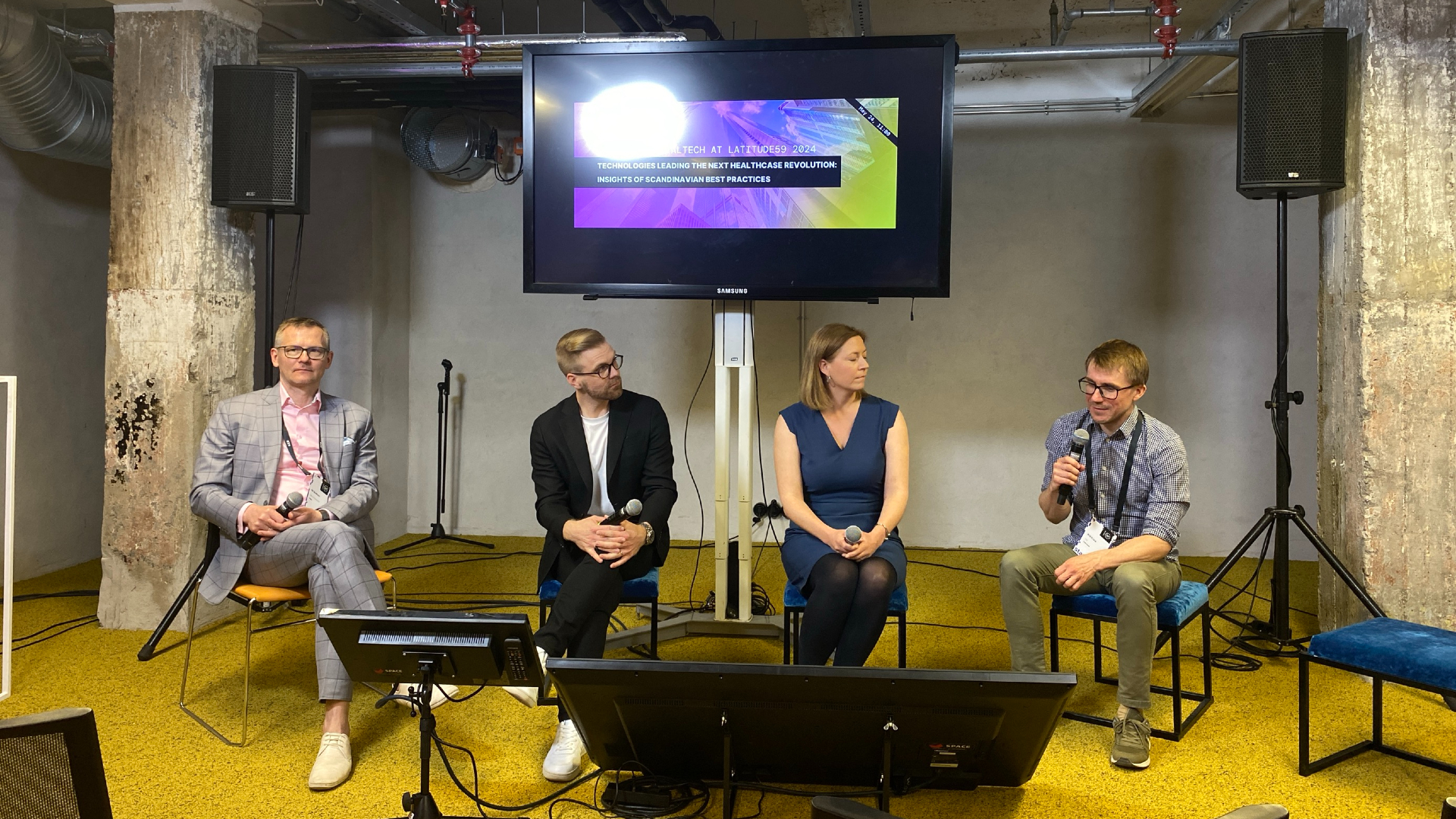12.06.2024
Experts: innovative products and services in healthcare must solve a real problem

Healthcare innovation primarily requires strong collaboration among healthcare institutions, the startup sector, and universities. Every new technological solution must be convenient for implementation and save time for healthcare workers, as determined by experts at a seminar titled “Technology Leading the Next Healthcare Revolution: Insights of Scandinavian Best Practices,” organised by Tehnopol and TalTech.
During the seminar, the discussions focused on developing health innovation in Estonia and shared best practices from Scandinavia. In the discussion, experts and members of the Tehnopol health technology community—Priit Kruus from the health technology company Dermtest and Ain Aaviksoo from HeBA clinic—opened up about their vision and experiences. Kenneth Salonius, CEO of Vertical VC, and Alexandra Gylfe, founder of Nordic Science Investments, presented examples from Scandinavia and explained the kind of collaboration investors expect between startups and healthcare institutions.
Importance of Ecosystem and University Collaboration
The panel discussion highlighted several key aspects of the health technology field, emphasising the need for collaboration between the ecosystem and universities. Given the extent of Estonia’s health technology ecosystem—currently the largest in the Baltics—local healthcare institutions and health technology companies have significant potential to make a global impact.
The panelists noted that frequent interactions and identifying collaboration points help clearly define real expectations, allowing technology to more efficiently solve real-life problems. Alexandra Gylfe from Nordic Science Investments stated that market solutions must meet real expectations, hence the need for clearer mapping of needs. “We need hospitals to identify the urgent problems we should focus on. There’s been a lot of noise in this field, with a strong focus on technical solutions, but it’s essential to bring innovation closer to what is truly needed.” explained Gylfe.
Gylfe cited Sweden’s Karolinska Hospital as an example. “Karolinska has done a great job clearly articulating their problems, such as emergency room waiting times. This clarity helps startups form partnerships with hospitals and test their solutions.” she said.
Ain Aaviksoo, development and partnership manager at HeBA clinic, agreed that research institutions play a vital role in promoting health innovation. “Creating ecosystems where universities are places to tweak, trial, and measure success is crucial. You also need a doctor in the hospital who champions your solution to drive innovation. Such collaboration allows startups to develop solutions that are well integrated into the healthcare system, increasing their effectiveness and adoption.”
He emphasized that any new technology must save time for healthcare workers, otherwise, it will not be adopted. “Any solution that adds another second to the workload will not be used,” he warned.
Kenneth Salonius, CEO of Vertical VC, noted that the implementation aspect in such a complex environment as the healthcare system should not be overlooked. “The challenge is twofold: Are the solutions addressing the real problems, and how do we adopt these solutions into such a complex environment?”
Market Entry Needs a Strategic Approach
Entering the market with a health technology product or service in a challenging environment requires a strategic approach. Priit Kruus, CEO of Dermtest, mentioned that the number of health technology startups has grown in recent years. Kruus highlighted the slow adoption of solutions as a bottleneck, noting that current healthcare reimbursement models do not support innovative remote services. He emphasized the need to develop reimbursement models that support digital health solutions, sharing Dermtest’s experience. “We developed a reimbursement model for psoriasis treatment that allows patients to use a digital solution instead of always going to the hospital, while the hospital still gets paid for providing the service and remotely monitoring the patients’ condition.” Kruus revealed.
Experts believe that startups need more than just training or community integration. Product or service development activities require systematic and professional support, also on government-funded financing. Through the health cluster led by Tehnopol, more than 26 joint developments worth over a million euros have been carried out over more than 10 years.
“If we had gone directly to the hospital five years ago and offered a remote monitoring platform, we would have been told that it does not fit their budget, because they are only compensated for the appointments when the patient comes to the healthcare institution in person.
Much work still needs to be done, but now this model example exists,” added Kruus.
In conclusion, the experts speaking in the panel discussion agreed that although significant progress has been made in the health technology sector, there are still many challenges that require a strong ecosystem and community contribution. Improving cooperation among stakeholders and providing systemic government support in financing is essential and a driving force for promoting health innovation. Attention must also be paid to ensuring that the integration of new technologies into existing systems is effective, which in turn is stimulated by a value-based financing model.
The article was first published on Med24 in Estonian.
The Tehnopol health technology community integrates the health community into one whole and, with the support of a supportive network, contributes to the meteoric rise of health technology companies both in Estonia and globally. The innovation created with the support of the community is meaningful, including co-creation projects promoting the local and international health sector, various events, community-integrating initiatives, and enhancing communication between ecosystem participants.
Want to join? Contact us!

















